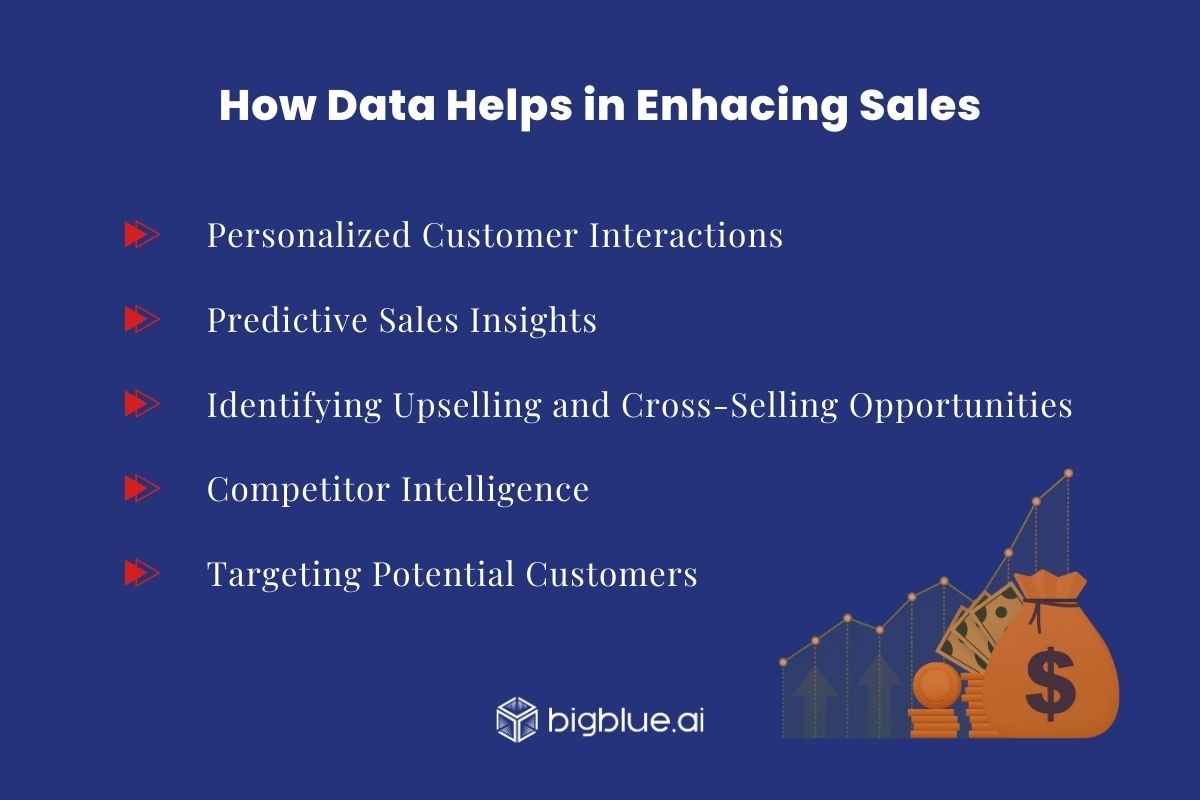Sales data has become a crucial element in modern sales strategies. Data-driven approaches can significantly improve decision-making, increase efficiency, and expand a company's capacity to close more deals in less time (Sales Intelligence & Automation). This connection between data and sales is transforming how businesses operate and succeed in competitive markets.
In today’s era, businesses need to make sales decisions that respond to continuous market changes, customer preferences, and competitor activities. Moreover, as the cost of acquiring new customers rises, sales teams within a company must judiciously allocate available resources while focusing on efforts to retain existing customers. A solid data strategy is crucial in enhancing sales by aligning data transformation processes with overall business goals. Additionally, ensuring data security during the transformation process is essential to protect data from breaches and unauthorized access.
Let’s now take a closer look at how data aids in sales.
Personalized interactions hold significant importance in sales. Data and its analysis allow businesses and sales teams to better understand individual customer needs, past interactions, and purchasing history. This enables companies to offer tailored solutions and build stronger customer relationships.
According to a recent studies, 80% of consumers are more likely to purchase from a brand that provides personalized experiences.
Analyzing historical sales data helps identify patterns and enhances the accuracy of predicting future sales. This insight provides actionable insights that assist sales teams in setting realistic and achievable goals, methodically allocating resources, and making necessary adjustments to meet performance objectives.
For instance, companies using predictive analytics have seen a 15% increase in sales productivity (McKinsey & Company).
Data further aids sales teams in identifying upselling and cross-selling opportunities among existing customers by leveraging existing data. By understanding customer needs, purchasing habits, and preferences, companies can recommend complementary products or services, thereby increasing revenue.
Research shows that upselling to existing customers is 68% more cost-effective than acquiring new ones.
Data also contributes to competitor analysis by providing critical information about market trends, competitors’ strengths, and weaknesses. By leveraging data assets, sales teams can gain a competitive advantage and differentiate themselves in the market.
Data integration significantly contributes to identifying potential customers by combining data from various sources and efficiently evaluating them based on specific criteria. This empowers sales teams to prioritize potential customers with the highest conversion probability, saving time and resources.
For example, lead nurturing—where companies use data to tailor their marketing efforts—can increase sales opportunities by 20% and generate 50% more sales-ready leads at a 33% lower cost. Furthermore, personalizing interactions based on detailed data analysis helps businesses effectively engage potential customers, leading to higher conversion rates.

As previously mentioned, data offers sales teams the ability to make informed decisions and adapt their strategies accordingly. Cleaning, standardizing, and aggregating raw data is essential to enhance data quality and usability for more accurate analysis. A sales team, particularly aided by a market analyst, is required to collect and analyze data based on key performance indicators (KPIs). Effective data management is crucial in collecting and analyzing these KPIs to ensure data quality and consistency. Some of the fundamental KPIs and data types to be collected and analyzed include:
Total revenue generated by the sales team
Total sales over time to track performance trends
Revenue per sale, indicating earnings from each transaction
Sales by lead source, revealing where sales originate
Percentage of revenue from existing customers (e.g., cross-selling, upselling, repeat orders)
Through the development of customized data-driven dashboards, centered around carefully selected KPIs, we have provided our clients with valuable insights that have directly contributed to increased sales.
An efficient data transformation process is crucial in building a data-driven sales approach, ensuring high-quality, reliable, and secure data for analysis and decision-making. It is also important to implement robust security measures, including encryption and access controls, to protect data from breaches and unauthorized access.
Given the volume of data, it’s crucial to define specific business goals, identify relevant measurements to achieve these goals, ensure data quality, and visualize data to present to decision-makers. Companies that leverage data-driven insights in their sales strategies have seen significant improvements. For instance, McKinsey reports that companies prioritizing and deploying advanced sales technologies, including data analytics and AI, experience a revenue uplift of 3-15% and a sales ROI increase of 10-20%
Data mapping offers essential insights into customer behaviour, preferences, and purchasing patterns. By analyzing data, businesses can create detailed buyer personas, enabling personalized sales approaches.
For example, companies that use detailed customer profiling report a 36% higher customer retention rate (Real Business).
Sales teams need to identify areas for improvement, such as bottlenecks in the sales process or underperforming segments. The impact of data transformation on data warehouses is significant, affecting data quality, efficiency, schema design, flexibility, and scalability. Utilizing a data warehouse along with tools like Business Intelligence (BI) and Machine Learning can guide sales efforts and reshape strategies.
A key example is the case of the Harley-Davidson motorcycle dealership, which, utilizing the power of artificial intelligence, managed to increase new sales by almost 3,000%.